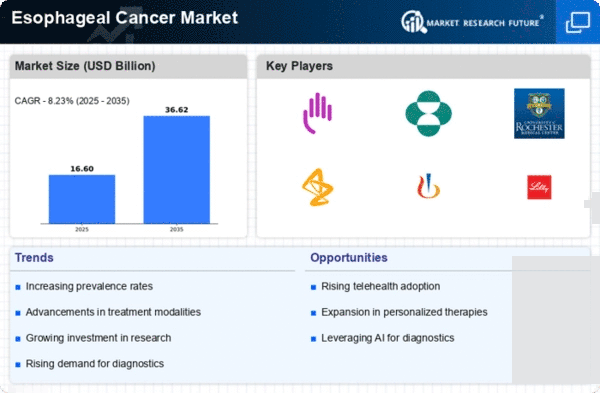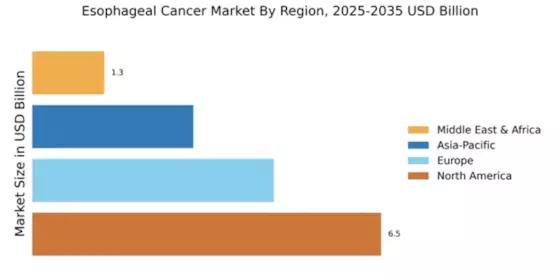North America : Leading Market Innovators
North America holds the largest share of the esophageal cancer market, valued at $6.5 billion in 2024. The region's growth is driven by advanced healthcare infrastructure, high R&D investments, and increasing awareness of esophageal cancer.
Regulatory support for innovative therapies and early detection methods further catalyzes market expansion. The rising incidence of esophageal cancer, coupled with a growing aging population, is expected to sustain demand in the coming years.
The competitive landscape in North America is characterized by the presence of major pharmaceutical companies such as Bristol-Myers Squibb, Merck & Co., and Eli Lilly. These key players are actively involved in developing novel therapies and conducting clinical trials to enhance treatment options.
The U.S. remains the leading country, accounting for a significant portion of the market share, while Canada is also emerging as a notable player in the region.
Europe : Emerging Treatment Innovations
Europe's esophageal cancer market is projected to reach $4.5 billion by 2025, driven by increasing investments in healthcare and innovative treatment options. The region benefits from robust regulatory frameworks that support clinical trials and the introduction of new therapies.
Additionally, rising awareness and screening programs are expected to enhance early diagnosis, contributing to market growth. The demand for targeted therapies and immunotherapies is also on the rise, reflecting changing treatment paradigms.
Leading countries in Europe include Germany, France, and the UK, which are home to several key players like Roche and AstraZeneca. The competitive landscape is marked by collaborations between pharmaceutical companies and research institutions to develop cutting-edge treatments.
The European Medicines Agency (EMA) plays a crucial role in regulating and approving new therapies, ensuring patient safety and efficacy in treatment options.
Asia-Pacific : Rapidly Growing Market
The Asia-Pacific esophageal cancer market is valued at $3.0 billion and is experiencing rapid growth due to increasing healthcare expenditure and rising awareness of cancer screening. The region's diverse population and varying healthcare access levels create unique challenges and opportunities.
Governments are implementing initiatives to improve cancer care, which is expected to drive market demand. The growing prevalence of risk factors such as smoking and dietary habits further contributes to the rising incidence of esophageal cancer. Countries like China, Japan, and India are leading the market, with significant investments in healthcare infrastructure and research.
Key players such as Pfizer and Bayer are actively involved in developing therapies tailored to the region's needs. The competitive landscape is evolving, with a focus on localized treatment options and partnerships to enhance patient access to innovative therapies.
Middle East and Africa : Emerging Healthcare Solutions
The Middle East and Africa (MEA) esophageal cancer market is valued at $1.34 billion, with growth driven by increasing healthcare investments and awareness campaigns. The region faces challenges such as limited access to advanced treatment options and varying healthcare quality.
However, initiatives by governments and NGOs to improve cancer care are expected to enhance market dynamics. The rising incidence of esophageal cancer, particularly in certain African countries, is prompting a focus on early detection and treatment strategies. Leading countries in the MEA region include South Africa and the UAE, where healthcare systems are evolving to meet the growing demand for cancer care.
The presence of key players is gradually increasing, with companies exploring partnerships to expand their reach. The competitive landscape is characterized by a mix of local and international firms working to improve treatment accessibility and patient outcomes.

















